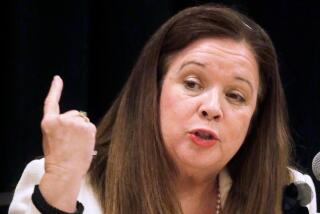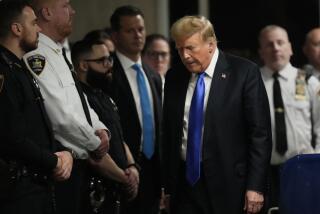Alternate Rampart Juror Complains of Panel’s Conduct
- Share via
An alternate juror in the Rampart corruption trial has complained about possible misconduct by jurors who convicted three police officers of conspiracy, prompting the judge in the case to meet behind closed doors today with defense attorneys and prosecutors.
Juror Wendy L. Christiansen, who has criticized Wednesday’s guilty verdicts, said her fellow jurors joked about police witnesses and talked about the case outside the courtroom, despite admonishments from the judge not to discuss the case until formal deliberations. In addition, she has alleged that jurors were biased against police.
Los Angeles Superior Court Judge Jacqueline A. Connor has scheduled an early morning meeting in chambers to discuss the allegations, said Kyle Christopherson, a Superior Court representative.
After the meeting, which will not be open to the public, defense attorneys could ask the court to overturn the convictions of Sgts. Edward Ortiz, 44, and Brian Liddy, 39, and Officer Michael Buchanan, 30.
However, legal experts said Thursday that a reversal based on such a complaint would be unlikely.
Christiansen did not return phone calls Thursday seeking comment.
But she spoke freely Wednesday, two hours after the verdicts were returned. Her voice shook with emotion and frustration as she said: “I would have acquitted on all counts.”
Christiansen said her fellow jurors were swayed by anti-police fervor and did not like the defendants or their attorneys.
“I do not understand how they could reach any verdicts of guilty without considering outside factors,” said Christiansen, 30, a former music company publicist who represents artists in the industry.
“I think that whether or not you liked the attorneys had some implications, which I think has no room in making a decision like this,” she said. “But it was obvious to me that many folks had some issues with some of the attorneys.”
She said she requested a meeting with the judge during the trial to voice her complaints, but changed her mind after being told by the court staff to put her request in writing. A source close to the case said Christiansen and Connor were in touch Thursday morning. But court officials would not say who initiated the contact.
Other jurors have complained that one juror slept through much of the testimony and that another sulked during part of the deliberations, flipping through a magazine rather than joining in the discussions.
The three officers were convicted Wednesday of fabricating evidence to frame gang members by a multicultural panel of seven women and five men. Jurors acquitted a fourth officer.
The convictions in the high-profile case were the first to arise from the yearlong Rampart police corruption scandal triggered by rogue former Officer Rafael Perez.
Harland W. Braun, one of the defense attorneys in the case, declined to comment, saying that he had been asked by Judge Connor to refrain from discussing the complaint. Other defense attorneys could not be reached for comment. A spokeswoman for the district attorney’s office also declined to comment.
Legal experts reached Thursday said it could be difficult to persuade the judge to throw out a verdict based on juror misconduct.
After the trial of Heidi Fleiss, for example, defense attorneys argued that the verdict was tainted by jury misconduct. Jurors admitted discussing the case outside court and trading votes on some counts in an effort to lower Fleiss’ prison time. The judge agreed juror misconduct occurred but refused to reverse the conviction, saying that the conduct had not resulted in an unfair trial.
“Jurors should not sleep. They should not talk outside the jury room,” said Laurie Levenson, an associate dean at Loyola law school. “This may not have been proper jury activity, but it is difficult to obtain a new trial unless you’re able to show that [the behavior] likely impacted the verdict.”
Santa Clara University law professor Gerald F. Uelmen agreed. He said it will be even more difficult given the fact that Christiansen did not formally complain during the trial.
“The jurors are told to report that kind of stuff when it happens,” Uelmen said. “They’ll be suspicious of a juror that waits until after the verdict. . . . There’s a risk of sour grapes.”
Art Patterson, a jury consultant with DecisionQuest, a local firm that helps attorneys select juries, said complaints by alternate jurors are suspect.
Alternates “want to participate in the process” and are frustrated when they can’t, he said. They occasionally vent by reporting misconduct by other jurors, and “putting the most negative spin on it.”
Patterson also said it is unrealistic to expect jurors not to discuss the case. He said the judge will have to investigate to determine exactly what was said.
“The reality of basic human psychology is, of course jurors form opinions. To have someone say, ‘Oh that guy was really lying,’ or ‘That lawyer is really a jerk’--it has very little impact,” he said.
*
Times staff writer Erin Texeira contributed to this story.
More to Read
Sign up for Essential California
The most important California stories and recommendations in your inbox every morning.
You may occasionally receive promotional content from the Los Angeles Times.













